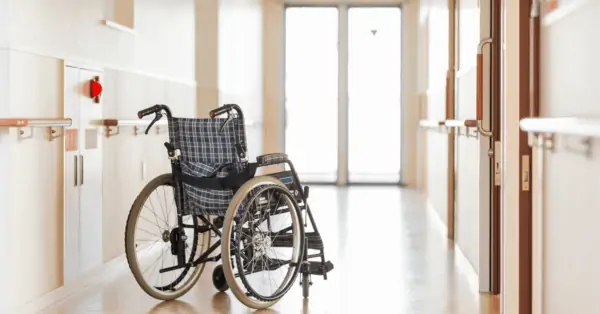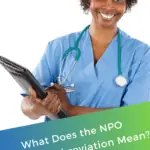Understanding NPO Medical Abbreviation: The term NPO, derived from the Latin phrase nil per os, is a crucial medical abbreviation used in hospitals and healthcare settings. It translates to nothing by mouth, indicating that a patient should not consume any food or liquids for a specific period. This article delves into the significance of NPO in patient care, exploring its use in various medical situations, the reasons behind its implementation, and essential considerations for healthcare providers and patients alike.
In the medical field, various abbreviations and acronyms are used daily. Unfortunately, these abbreviations can be confusing if you are a new nurse, healthcare professional, a patient, or caregiver trying to decipher physician instructions. But don’t worry. We’ve got your back.
We’re going to dig a little deeper to give you a better understanding of the NPO medical abbreviation. What does NPO stand for? And what does it mean for patients? Read on to find out.
- What Does the NPO Medical Abbreviation Mean?
- What Does NPO Mean for Patients?
- Common Situations Requiring NPO Status
- Hospital Settings Commonly Encountering NPO Patients
- What Are the NPO Guidelines?
- Potential NPO Complications and Considerations
- What Are the Risks of Not Being NPO?
- NPO for people with diabetes
- Taking Medication while Being NPO
- Also Check Out
What Does the NPO Medical Abbreviation Mean?
NPO means “nothing by mouth,” from the Latin nil per os. The term describes a patient who cannot have anything to eat or drink by mouth, including both solids and liquids. In other words, an NPO patient is on a complete fast.
Because of this, NPO orders are usually given to patients who will have surgery or another procedure where they will be under anesthesia. This is because anesthesia can cause nausea and vomiting, so the stomach must be empty before the surgery begins.
When patients are NPO, they are not allowed to eat or drink anything, not even water. This is usually done for one of two reasons.
- The patient is going to have a procedure that requires them to be under anesthesia.
- Their doctor wants them to have an empty stomach so they can better assess any digestive issues they are experiencing.
If you are scheduled for a procedure that requires you to be NPO, your doctor or nurse will give you specific instructions on how long you need to fast.
You must follow these instructions to the letter; if you don’t, there is a risk that your procedure could be canceled or postponed, or you could experience complications during or after the surgery.
Origins and Meaning of NPO
NPO, originating from the Latin term ‘nil per os’, literally translates to ‘nothing by mouth’. Historically, this practice has been integral in medical care, ensuring that patients are adequately prepared for surgeries or specific diagnostic procedures. It’s not just a modern medical practice but a time-honored principle that has evolved with healthcare advancements.
What Does NPO Mean for Patients?
If you are on an NPO order, following your medical team’s instructions is essential. This means not eating or drinking anything, even if you tolerate it. It’s also important to avoid chewing gum, sucking on hard candy, or drinking any liquids.
Does NPO really mean NOTHING by mouth?
Yes. If a patient is NPO there is a good reason for it. Water, black coffee, popsicles, and anything else that you might think could slide are still off-limits. An NPO patient can’t even suck on ice chips unless given explicit permission to do so.
Why NPO is Important in Patient Care
Implementing NPO status is often crucial for patient safety, particularly before surgical procedures. It prevents the risk of aspiration – where food or liquids can enter the lungs under anesthesia – and ensures that the digestive system is at rest during and after surgical interventions. Additionally, for patients with specific medical conditions, such as gastrointestinal disorders, NPO can be essential for managing symptoms and preventing complications.
Common Situations Requiring NPO Status
NPO is commonly required in situations like pre-operative preparation or before certain diagnostic tests like abdominal ultrasounds. It’s also imperative in emergency settings, where rapid medical response is needed, and the patient’s digestive status needs to be controlled. In cases of gastrointestinal distress, NPO helps in managing symptoms and facilitating recovery.
Why Is It Important to be NPO Before Surgery?
Before surgery, your stomach must be empty. This is because anesthesia can cause nausea and vomiting. If food is in your stomach, you may vomit and inhale (aspirate) the vomit into your lungs. This aspirated vomit can cause a severe complication called aspiration pneumonia.
Patients are typically placed on an NPO order before surgery to avoid this complication. This means they cannot eat or drink anything, including water, for a certain period before their surgery. The length of time will depend on the type of surgery and the medical team’s recommendations.
GI Reasons for Implementing NPO Status
In gastrointestinal (GI) health, implementing NPO status can be a critical aspect of managing various conditions. Certain GI disorders require the digestive system to rest, where the directive of ‘nothing by mouth’ becomes crucial. Here, we explore some common GI-related reasons why a patient might be placed under NPO status.
- Gastroparesis: Gastroparesis, a condition characterized by delayed stomach emptying, often necessitates NPO status. In these cases, consuming food can exacerbate nausea, vomiting, and abdominal discomfort. By enforcing NPO, healthcare providers aim to reduce these symptoms, prevent complications, and allow the stomach to rest and recover.
- Inflammatory Bowel Diseases: Conditions such as Crohn’s disease and ulcerative colitis may also warrant temporary NPO status during flare-ups. Allowing the bowel to rest during these periods can help reduce inflammation, alleviate symptoms, and prevent further irritation of the digestive tract.
- Pre-Endoscopic Procedures: Patients undergoing certain endoscopic procedures, such as colonoscopies, are often placed on NPO status. This ensures that the digestive tract is clear of food residues, allowing for optimal visibility and effectiveness of the procedure.
- Acute Pancreatitis: In acute pancreatitis, where the pancreas becomes inflamed and painful, NPO status is essential to manage the condition. It helps minimize pancreatic stimulation, reducing the production of digestive enzymes and alleviating pain and inflammation.
- Severe Gastroenteritis: In severe cases of gastroenteritis, where patients experience intense vomiting and diarrhea, NPO status can be necessary. It helps to prevent further irritation of the GI tract and allows time for the inflammation to subside.
- Postoperative Care: Following certain GI surgeries, patients are often placed on NPO to allow the digestive system to heal. Gradually, as the recovery progresses, a structured reintroduction of foods and liquids is planned to ensure that the digestive system can handle them without complications.
In all these scenarios, the primary goal of NPO status is to provide the GI tract with the necessary respite to recover and heal. You might hear this referred to as “bowel rest.” Healthcare providers closely monitor the patient’s condition and nutritional needs during this period, providing alternative forms of nutrition, such as intravenous fluids, parenteral nutrition, or tube feeding, to maintain the patient’s overall health.
NPO for Safety or Other Benefits
- Preparation for Diagnostic Imaging: Certain imaging tests, like an MRI or CT scan of the abdomen, require an empty stomach to ensure clear images.
- Risk of Aspiration: Patients with swallowing difficulties or at risk of aspiration pneumonia may be placed on NPO to prevent food or fluids from entering the lungs.
- Severe Dehydration or Electrolyte Imbalance: In cases where oral intake could exacerbate these conditions, patients might temporarily be NPO.
- After General Anesthesia: Immediately following surgery or procedures requiring anesthesia, patients are often NPO until full consciousness and normal reflexes return.
- Severe Infections or Sepsis: In critical conditions like sepsis, where the body’s response to infection can affect multiple organ systems, NPO status can be essential for stabilizing the patient.
- Head, Neck, or Oral Surgery: Postoperative care for surgeries in these areas may include NPO status to facilitate healing and prevent complications during eating or drinking.
- Intubated Patients in Intensive Care: Patients who are intubated or on mechanical ventilation are typically NPO to ensure airway protection.
- Cardiovascular Instability: In cases of severe heart failure or other cardiovascular conditions, fluid intake must be tightly controlled.
- Metabolic Conditions: Certain metabolic disorders, like acute diabetic ketoacidosis, may require NPO status as part of the management and treatment strategy.
- Severe Nausea and Vomiting: In conditions such as hyperemesis gravidarum during pregnancy, where severe nausea and vomiting make oral intake impossible or harmful.
- Preparation for Contrast Studies: Some diagnostic tests using contrast materials necessitate NPO status to prevent interactions with the contrast agent and enhance the test results’ quality.
- Psychiatric Conditions: In certain psychiatric conditions where there is a risk of self-harm or harm to others, NPO status might be temporarily implemented for safety reasons.
In each scenario, the NPO status is a strategic decision made by healthcare providers to ensure patient safety, facilitate accurate diagnosis, or enhance the effectiveness of treatment and recovery processes.
Hospital Settings Commonly Encountering NPO Patients
An NPO directive is frequently encountered in various hospital settings. Different units within a hospital have distinct needs and protocols for implementing NPO status, based on the patient’s condition and the specific treatments or procedures being undertaken. Below are some of the typical hospital settings where NPO status is regularly implemented:
- Surgical Units:
- Pre and post-surgery patients.
- Prevention of aspiration during anesthesia.
- Intensive Care Units (ICUs):
- For intubated or mechanically ventilated patients.
- Safety of the airway and facilitation of medication administration.
- Emergency Departments (ED):
- As a precaution for patients who may require urgent surgery or invasive procedures.
- Gastroenterology Units:
- Patients with acute gastrointestinal issues like pancreatitis or bowel obstructions.
- Allows the digestive system to rest during treatment.
- Pediatric Units:
- Especially in infants and young children undergoing procedures.
- Ensuring safety during sedation or anesthesia.
- Neurological Units:
- For patients with swallowing difficulties due to stroke or other neurological impairments.
- Prevents aspiration pneumonia.
- Oncology Units:
- For certain cancer treatments or diagnostic procedures.
- Managing risks associated with nausea and vomiting from chemotherapy.
- Radiology Departments:
- Prior to imaging procedures, particularly in the abdominal area.
- Ensures clearer imaging results.
In each of these settings, the application of NPO status is tailored to the patient’s specific medical needs, with careful monitoring and adjustment as required.
What Are the NPO Guidelines?
There are different NPO guidelines depending on the type of surgery you have. And it’s essential to follow the specific guidelines for your surgery.
For example, suppose you have a general anesthetic (for surgery on your stomach, intestine, or colon). In that case, you must be NPO for 8 hours before the surgery. This means no food or drink, including water, for 8 hours before your surgery begins.
If you have a regional anesthetic (such as for surgery on your hand, foot, or arm), you must be NPO for 4 hours before the surgery.
And if you have a local anesthetic (such as for a skin biopsy), you will not need to be NPO.
These are just general guidelines, so be sure to follow the specific instructions of your medical team.
Duration and Monitoring of NPO Status
The duration of NPO varies depending on the medical situation. It can range from a few hours before a procedure to more extended periods in complex medical cases. Throughout NPO status, nurses should closely monitor the patient’s hydration and nutritional needs to maintain overall health.
Managing Patient Needs During NPO
While a patient is NPO, managing their comfort is a priority. Nurses and other healthcare team members work to distract from hunger and thirst and provide reassurance and support. In some instances, alternatives or exceptions to NPO, like allowing specific medications with minimal water, are considered to balance medical needs and patient comfort.
Potential NPO Complications and Considerations
Food is such a big part of our lives. It comes with many complex feelings. Telling someone they cannot eat or drink may trigger panic. Considering it’s at the foundation of Maslow’s Hierarchy of Needs, you may need to offer reassurance. Although the risks are minimal with short-term NPO status, you must be aware of them at least.
Risks of Short-Term NPO Status
- Increased Agitation and Irritability: The discomfort from hunger can lead to agitation, especially in patients who are already anxious or stressed about their medical condition or treatment.
- Dry Mouth and Lips: Lack of fluid intake, even for a short period, can result in dryness of the mouth and lips, causing discomfort and difficulty in speaking or swallowing.
- Hunger Pangs and Discomfort: Missing meals over a short duration can cause physical discomfort due to hunger pangs, which might be particularly distressing for children and elderly patients.
- Thirst and Dehydration Symptoms: Even short-term fluid restriction can lead to feelings of intense thirst, along with early signs of dehydration such as a dry or sticky mouth, fatigue, and lightheadedness.
- Difficulty in Swallowing Medications: For patients who need to take regular medication, NPO status can make it challenging to swallow pills, potentially impacting their ongoing treatment.
- Headaches and Dizziness: Some individuals may experience headaches or dizziness due to a lack of food and fluid intake, even if for a brief period.
- Mood Fluctuations: The discomfort and irritability due to hunger and thirst can lead to mood swings or exacerbate underlying mental health conditions.
Healthcare providers usually implement strategies to minimize these effects, such as providing ice chips to keep the mouth moist or carefully scheduling NPO periods to reduce discomfort.
Risks of Prolonged NPO Status
While necessary, prolonged NPO status can lead to complications such as dehydration, nutritional deficiencies, and psychological distress due to hunger or thirst. Therefore, it’s crucial to balance the medical necessity of NPO with the patient’s overall well-being, considering their age, underlying health conditions, and specific medical needs. Here is a detailed list of risks related to being NPO for an extended period of time:
- Dehydration: Even short-term NPO status can lead to dehydration, especially in vulnerable populations like the elderly or infants, as they might miss out on regular fluid intake.
- Hypoglycemia: For patients with diabetes or those susceptible to low blood sugar levels, short-term NPO can result in hypoglycemia, requiring careful monitoring and management.
- Nutritional Deficiencies: Missing even a few meals can impact the nutritional balance, particularly in individuals with pre-existing nutritional deficiencies or in those with high nutritional needs, such as pregnant women or athletes.
- Medication Management Challenges: NPO status can disrupt regular medication schedules, especially for medications that need to be taken with food, potentially leading to suboptimal treatment outcomes.
- Psychological Impact: Anxiety, stress, or discomfort due to hunger or thirst, especially in children or individuals with mental health concerns, can be a consequence of even short-term NPO.
- Electrolyte Imbalance: A lack of intake can quickly lead to imbalances in electrolytes, which are crucial for many bodily functions, potentially causing cardiac and neurological issues.
- Gastrointestinal Discomfort: In some cases, an empty stomach for prolonged periods can cause discomfort, nausea, or gastric irritation.
What Are the Risks of Not Being NPO?
If you are not NPO when you are supposed to be, there are a few risks.
- First, you may aspirate vomit into your lungs if you have surgery under general anesthesia. Aspiration pneumonia is a serious complication that can be life-threatening.
- Second, you may not be able to have your surgery if you are not NPO. This is because the anesthesiologist will not want to take the risk of aspirating vomit during the surgery.
- And third, you may delay your surgery if you are not NPO. This is because the surgery may need to be rescheduled later.
So, it’s important to follow your medical team’s instructions and be NPO when you are supposed to be.
NPO for people with diabetes
Some patients with diabetes may have to be NPO for a longer period before surgery. This is because they may need to adjust their insulin doses before surgery.
If you have diabetes and are scheduled for surgery, be sure to follow your medical team’s instructions. They will let you know how long you need to be NPO and how to adjust your insulin doses. You will want to be sure you keep a close eye on your blood glucose (blood sugar) levels and communicate if there any concerns.
Taking Medication while Being NPO
Adjusting medication schedules and dosages is often necessary during NPO status. Medical teams carefully evaluate which medications are essential and may allow them with minimal water intake. This ensures the patient’s ongoing medical needs are met while maintaining NPO guidelines.
In many cases, you may be told to be NPO for a medical procedure but allowed to drink “a little sip of water” to take your morning medication before a procedure. This is a risk/benefit situation, where missing the drug presents a greater risk to your health than a tiny sip fo water. It’s always best to ask for clarification before making any assumptions as some medications should be skipped in NPO situations.
What Can I Eat or Drink If I Am On NPO status?
If you are on Npo status, you should not have anything to eat or drink, including water. You may be able to have ice chips or hard candy if your doctor or nurse says it is okay. Ice chips and hard candy can help to keep your mouth moist and help you avoid getting too thirsty.
Conclusion:
If you are on NPO status, following your doctor’s or nurse’s instructions is essential. You should not have anything to eat or drink, including water.
Also Check Out
- What does PRN Stand for and When Should it Be Used?
- EtOH Medical Abbreviation – EtOH Meaning and Application in Nursing
- What Does Bid Mean in Nursing
- What Does the TID Medical Abbreviation Mean?






